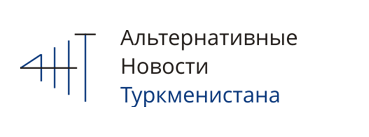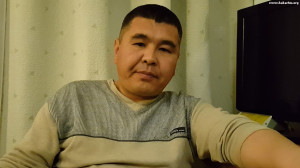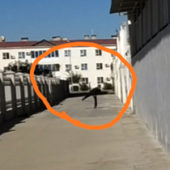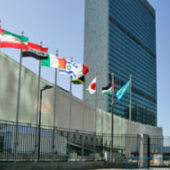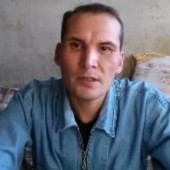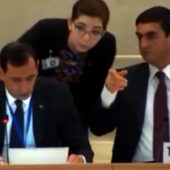Contact: Ruslan Myatiev
Tel.: +31 6 84654547
E-mail: [email protected]
‘It’d be better for us if he died soon!’ –
Cellmate Tells on Camera about Fate of Activist Nepeskuliev in Turkmen Prison
Amsterdam, February 25 – A man who shared a prison cell with Turkmen journalist and civic activist Saparmamed Nepeskuliev, sentenced to three years in July 2015 on false charges of illicit trafficking of drugs, has spoken on camera to Alternative Turkmenistan News (ATN).
In the beginning of February Yerik Supushev, a Kazakh national, wrote to ATN claiming he had recently returned from Turkmenistan where he served a prison term. According to Supushev, part of his term he served together with ATN’s colleague, Turkmen civic journalist Saparmamed Nepeskuliev.
Supushev worked as a truck driver in one of Kazakhstan’s firms, often delivering freight to Turkmenistan. During his last trip there in April 2015, he was arrested with large amounts of tobacco at the Kazakh-Turkmen border. After a four-month detention in a pre-trial prison in Akdash village (Western Turkmenistan), the court found him guilty of contraband and sentenced him to one year.
It was in Akdash that he shared a cell with ATN’s reporter Nepeskuliev. After his release in January 2016 and deportation to Kazakhstan, ATN met with Supushev and video recorded his testimony about Nepeskuliev, who went missing since his arrest. Please watch the interview with Supushev in Russian with English subtitles on YouTube or by this link. Below is the full transcript of Supushev’s testimony.
In December 2015 the UN Working Group on Arbitrary Detention found Nepeskuliev’s deprivation of liberty arbitrary. Earlier in 2015 a number of international organizations, including the Committee to Protect Journalists, Reporters without Borders, Amnesty International, Human Rights Watch, the OSCE and many others demanded the release of Nepeskuliev.
ATN is convinced that Nepeskuliev was imprisoned because of his journalism work. ATN once again urges the authorities of Turkmenistan to release Nepeskuliev, and international human rights organizations and Western governments to continue putting pressure on the Turkmen authorities regarding the case of Nepeskuliev.
***
— My name is Yerik Tabyldievich Supushev. In 2015 I was sentenced by a Turkmen court for handling contraband. As proof, here is my prison release certificate. I was released in January 2016.
[Camera shows the certificate along with a copy of the letter of the Turkmen Foreign Ministry to the Embassy of Kazakhstan in Turkmenistan about the arrest of their citizen]
When I was under investigation, I happened to share a cell with a Turkmen journalist. His name was Saparmamed Nepeskuliev. We shared the same cell with him for almost a month. There I learned that he was working as a journalist in “Azatlyk” [Radio, RFE/RL Turkmen Service].
He briefly told me about himself: how he was imprisoned, who he worked for. I know that he was framed, that Tramadol [opioid pain medication] was planted on him, when in Krasnovodsk he went to photograph the Avaza resort.
At this time, he left his bag with clothes in the luggage room of his hotel. When he picked up his bag upon return, two officers of the National Security Ministry arrested him right at the door of the hotel, though it was not under their jurisdiction – the Drugs Police should have handled it.
Before Nepeskuliev joined us, there were no restrictions for us to receive food from inmates from other cells. There in prison, they call it Sadaka – a charity, which includes bread, cigarettes and tobacco etc. Other inmates shared it with us, the foreigners, because nobody ever came to visit us. Otherwise, we had absolutely nothing, we were eating only gruel.
So you were already when Nepeskuliev was brought in?
Yes, I was there for two months already before he came. In total I was there for three months under investigation. I called him Sergey; this is how he introduced himself. He said he was a Russian citizen. He had a Russian passport. He was brought in together with another man, a Turkish national.
Do you remember that Turkish man’s name?
Yes, I do. His name was Erkan Gunesh.
Was he also there for Tramadol?
Yes, he had 15,000 Tramadol pills on him when he got caught.
INCOMMUNICADO DETENTION
After Saparmamed joined you in a cell, did your detention conditions change?
Yes, very much. They banned everything that we used to receive from other cells. They completely banned everything. You could not take or give anything anymore. Though we could not give anything, since we had nothing. Everything was banned. The entire month we lived only on gruel.
Were there any reasons behind it? Did anybody tell you anything?
Yes, I had a talk with the deputy chief of that prison. His name was Nury.
It was in Akdash, right?
Yes, in Akdash. Nury, his rank was captain. He frankly admitted everything… I approached him and asked: “Nury, did I do anything evil to you?” To this he replied: “What are you talking about?” I said: “About this ban on everything”. A “frost” as they call it. He asked: “Do you know who is in there with you?!” I asked: “Who?” And he said: “Radio ‘Azatlyk’!” I said: “So what? Radio “Azatlyk”… So what?”
Back then I did not even know him. Sergey, Sergey… serving a term. I only knew the article he was charged with – 303. Possession of Tramadol…
I asked the deputy chief: “He is charged with Tramadol, what does “Azatlyk” Radio have to do with it?” He said: “No, we were told… We received a phone call from high above… And we were threatened quite explicitly: We won’t just fire you, but will put you in prison!” And he was quite frightened. He said: “They really mean it.”
If what happens?
If any information goes out from that cell. We never had it like that before. We were free to share things with inmates from other cells.
CLOSED TRIAL AND NO ATTORNEY
Did Saparmamed ever tell you how he was tried?
Yes, he did. He said the court sentenced him to 3 years. I asked him: “How did the hearing take place?” Since he is a Russian citizen, has a Russian passport, they should have invited a Russian consul; that’s the rule, right? But he had a closed trial.
There were two National Security officers, as he told me… Not sure if there was a prosecutor. No attorney. And a judge. The judge walked in, read his verdict and that’s it! No actual hearing, nothing. He simply walked in, read his verdict and it was over. He walked out.
When the UN Working Group on Arbitrary Detention considered Nepeskuliev’s case, the government of Turkmenistan responded that Nepeskuliev was provided with an attorney. What did he tell you about that? Did he have a lawyer?
No, he did not have one. Perhaps it was even better that he did not have a lawyer. If there had been one, perhaps Nepeskuliev would have gotten more than what he got. Because lawyers, prosecutors and judges – all work together there.
Did Nepeskuliev’s relatives: his mother or his sister, have access to him when you were together in Akdash?
For a long time nobody knew about his fate. Then, somehow his sister found him. She came over, brought a parcel. This was only once. That’s it.
Did he tell you anything about whether or not he was beaten during investigation or in Akdash?
I think he was not. Because if he had been beaten, he would have told me. When he was arrested, he was taken to the Drugs Police. The National Security officer that arrested him, made sure a witness was present, who a year ago allegedly bought a Tramadol pill from Nepeskuliev.
So, when Nepeskuliev was arrested, they brought someone who testified that a year ago he bought a Tramadol pill from Saparmamed, right?
Yes, correct. Then Saparmamed said to this old man: “Who are you?! I don’t even know you! Sir, aren’t you ashamed to falsely testify against me?” And the man blushed and said nothing. Later Saparmamed saw him in the hallway speaking to that National Security officer, shaking hands and saying goodbyes.
So, most likely, this witness was brought by the National Security officer?
Yes, it was a stool pigeon who was brought there specifically to testify against Nepeskuliev.
One other thing. Nepeskuliev had a weak stomach, he was always on medication. He told me that once at the Drugs Police office his stomach started to ache. He asked his investigator to give him a pill from his bag. He said to him: “My stomach aches, I need to take a pill, otherwise it will twinge. So, the investigator left and brought him a red pill, saying “This is Mezym Forte [a medicine against stomach ache], take it and it will ease you.” So, Nepeskuliev took it and indeed felt better. But then, after one hour, doctors came and took his urine sample for a drugs test, to see if there was Tramadol in his urine. The tests results revealed high concentration of Tramadol in his urine. This was another way they planted drugs on him.
I saw people in prison who used to take Tramadol regularly in large quantities; they suffer a lot when they don’t have it. They are like drug addicts; they want to climb a wall when they don’t have it. They can’t sleep at nights. They constantly get up, walk around, they don’t know what to do. But Nepeskuliev was not like that.
So, can you say that Saparmamed was a drug addict? That he was on Tramadol?
No, no! I would not say so.
On the Internet, some websites that are associated with the Turkmen security services call Nepeskuliev a psychopath, a man with mental issues. They call him insane. You spent quite some time with him, can you call him a mentally ill person?
— No, surely not… A psychopath… [laughs] I have known some psychopaths in my life. I have seen them. No, Sergey was not a psychopath. He was very intelligent and thoughtful man. He was completely healthy in that sense. We shared a cell for about a month.
HUNGER STRIKE IN PRISON
You also told on the phone that Nepeskuliev went on the hunger strike while there. Can you tell about it?
Yes, this happened. He went on hunger strike. He didn’t take anything but tea.
When was it approximately?
It was in… August. Yes, in August, in Akdash. Because in September I was transferred to a camp.
What did he want to achieve with it?
He wanted to get through to the Russian Embassy, to draw their attention to his case. Or the attention of the UN. Or at least to get a lawyer, to do something about his case.
When I approached the pre-detention facility chiefs and asked whether they were aware that Nepeskuliev was on hunger strike, that he did not eat anything, they said that it’d be better for them if he died quickly. No problem.
So, they did not care about his hunger strike?
Absolutely not. They did not care. Human life means nothing there.
STOOL PIGEONS IN CAMP AND ISOLATION
When did they transfer you to the camp?
On September 15th [2015]. On the 17th, at night, we were already [at LB-K/12 camp] in Shagal village, near Seydi.
Did Saparmamed go with you then?
Yes, he went with me. We were on the same transport as far as Ashgabat. Then, he carelessly asked someone whether there was Internet access or a mobile phone available in that camp. Stool pigeons immediately sold him out. The guards walked in and yelled: “Saparmamed Nepeskuliev!” He said: “Here!” — “Get out!”
He was taken off the train and held separately. He was isolated.
So, somebody sold him out – his intentions to inform the world about his fate?
Yes, exactly. He was held separately until the train. In the train he travelled separately from the rest of the prisoners.
Till Shagal, right?
Yes, till Shagal. There, from Shagal to the camp, he also rode in a separate carriage. Then, when we entered the quarantine zone in the camp, he was again kept away from us.
How many days did you spend in quarantine?
11 days. There was another interesting thing that I noticed. When on the second day they took us out to shave our heads, Saparmamed was also taken out.
And, on the day of our arrival, during the shakedown, another man was brought to us. A young Turkmen guy, named Rustam, was brought without any escort. The guards strip searched him as well, but very superficially. He just raised his arms, did not even take his clothes off, the guards checked him quickly and said: “Clear!”
So, on the day we were shaved, he was already sitting by Saparmamed. And, Sergey [Saparmamed], you know, is a kind of person that does not easily talk to strangers. But this guy, Rustam, started to talk with him, asking him questions. Only him, not others. I thought that this man was a stool pigeon, specifically there for Saparmamed – to control him, what he tells, how he tells, etc.
A bit later, when Rustam was sitting among us, one of the guards came in, smoking a cigarette. Rustam asked him: “Chief! Let’s have a smoke together!” And they left for the exercise yard. What were they talking about there remains unknown.
We spent 11 days in the quarantine. It was a room 3×3 meters, with a concrete floor. We were 14 people there, can you imagine?! 14 people had to sleep for 11 days sitting upright! They deliberately create such conditions to make money. Money is the guards’ top priority! Prisoners pay off the guards in order not to spend 11 days on the concrete floor. It was very cold. No glass in the window, just the metal bars. Nobody could sleep due to the cold. We all huddled together. We piled our feet in the middle, and the one whoever fell asleep first, ended up with frozen feet. He’d wake because of numb feet and would have to drag them out with hands. We had elderly people among us, pensioners…
Did you get to see Nepeskuliev there, in that camp, in LB-K/12?
I didn’t see him anymore. When I got out from the quarantine, after 11 days, I asked a few guys about Saparmamed, but nobody knew anything. Then I asked this guy, Rustam: “Where is Sergey, why is he not out of the quarantine?” He murmured something in response, but didn’t say anything clear. I was afraid to ask too many questions, knowing where and in what type of environment I have to be, in which country, I was afraid to persistently ask many questions. What if Rustam went to report that this Kazakh man was asking questions about the journalist? And I would be in trouble then. There, it is not a big deal to slap on extra charges! They’ll give you a new term and that’s it!
Were there such cases?
Yes, there were. There was a man, charged with Wahhabism, imprisoned for 5 or 6 years. He fully served his term. When he was about to be released, he was brought to the quarantine zone, where we were. Another stool pigeon, who longed for freedom, was also put with him. He was promised amnesty. So, the Wahhabi guy and this stool pigeon were both taken to the exercise yard. And then the stool pigeon started to beat his own head against the wall and yelled: “Help me! He’s killing me!” The guards broke in and started to beat the Wahhabi guy with batons. Eventually, the Wahhabi guy got additional 17 or 18 years of prison. Then, there were rumors that the camp chief came over to him and said: “I’m sorry, I didn’t want it. The order came from above.”
Wahhabis are not freed there! Never! If you are charged with Wahhabism, it’s the end of your life. You’ll rot in prison.
If you had a chance to address to Nepeskuliev, imagine he is watching this video right now, what would you tell him?
Dear Sergey, this is what I want to tell you [smiles], I promised you, though you were afraid of me, afraid of speaking to me. As I told before, I had good relations with that pre-detention facility chief in Akdash. Once in a while, the deputy chief would invite me for a talk.
Once he asked me about Saparmamed, what he tells me, what he thinks about this place. I remember I said: “What should he tell me?” And he said: “About this place, in general?” I said: “I can tell you myself about this place – it’s complete lawlessness!” He said: “I am not asking about your opinion! I need Nepeskuliev’s opinion!” I said: “What can Nepeskuliev say? He does not say anything!” He said: “Ah, you are lying!” I said: “Look, Nury, let’s not argue now. I won’t tell you anyway. If you called me specifically to find out what Saparmamed tells me.”
So, when I returned, Saparmamed was suspicious about me. Perhaps he thought that I was reporting on him.
So, Sergey, you should have trusted me. I promised you that I would definitely talk about you. I found your friend, the one you told me about. I contacted him and told everything I knew about you. Everything that you told me yourself – that you were framed, that you asked for help. I hope that my interview helps you to finally get out of prison. And, finally, move from that country and live a normal life. They won’t let you live there anymore. Yesterday was a madhouse, today – a prison, and tomorrow – maybe a brick falls on your head, who knows? I wish you luck and release very soon!
— END —
